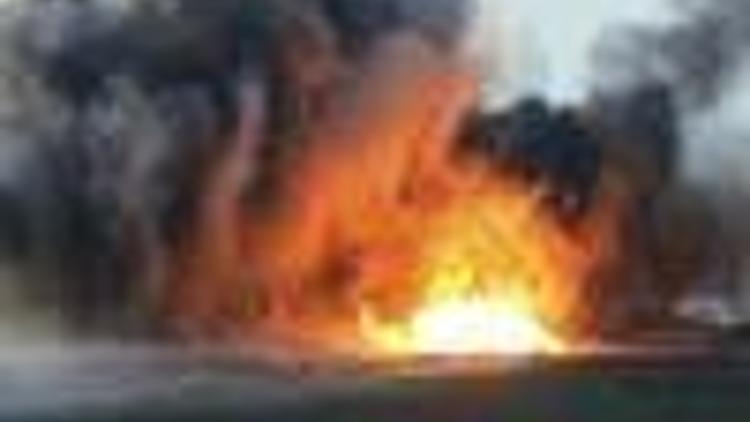Oluşturulma Tarihi: Ocak 08, 2009 08:06
Israeli forces fired mortars across the border into southern Lebanon Thursday after rockets were fired into northern Israel, officials said. No group has claimed responsibility for the rocket firing from Lebanon. (UPDATED)
"As far as we know, it was a false alarm," an army spokesman told AFP.
Warning sirens in the town of Nahariya went off by accident and area residents reported hearing explosions, but the sounds were apparently sonic booms by Israeli air force, he said.
Israel hit back after a first salvo with artillery shells in what an Israeli army spokesman described as "a pinpoint response at the source of fire", a limited military reaction that appeared to signal a desire to avoid escalation.
At least three rockets fired from Lebanon slightly wounded two people in the area around the northern town of Nahariya, medics said.
No group has claimed responsibility for the rocket fire from Lebanon.
The rockets were the first fired from Lebanon since 2007, and occurred on the 13th day of the Jewish state's offensive in the Gaza Strip to the south.
Palestinians fired rockets from Lebanon into northern Israel in June 2007, causing no casualties. During a 2006 war against Hezbollah guerrillas in Lebanon in 2006, the Israel had came under frequent rocket attacks that caused casualties.
HEZBOLLAH, HAMAS DENY INVOLVEMENT
Hezbollah has made it clear to the Lebanese government, in which it has a representative, that it was not involved in Thursday's rocket attack into northern Israel, Information Minister Tarek Mitri told AFP.
"Hezbollah has assured us that they remain committed to stability and Resolution 1701 and that is a euphemism for saying they are not involved," Mitri said, referring the UN Security Council resolution that brought an end to the devastating 2006 war between Israel and Hezbollah.
Although it was unclear who fired the rockets and whether it signaled the start of a wider conflict, the exchange was certain to raise tensions between Hezbollah and Israel after days with the two sides trading threats but holding their fire.
The rockets fell a day after the chief of Lebanon’s Hezbollah, a Shi’ite militia with which Israel fought a 34-day war in 2006, warned that "all possibilities" were open against Israel amid its deadly offensive in Gaza.
Israeli analysts have said the Iranian-backed Hezbollah group may try to get involved in Israel's battle against Hamas in Gaza. Hamas is also backed by Iran.The rockets into Israel could have been set off by Palestinian groups in retaliation for the war in Gaza, Israeli media reported. Radio and television reports cited unnamed military sources saying it was likely an isolated attack.
Palestinian Islamist group Hamas, however, denied it was responsible for firing rockets into northern Israel from south Lebanon.
"We cannot blame any Palestinian faction and we don’t know who fired the rockets," Hamas spokesman in Lebanon, Raafat Morra, told AFP.
"Hamas is pursuing its combat inside Palestine and our principle is not to use any other Arab soil to respond to the occupation. This is our firm policy," he said. "Basically what is happening is the fault of Israel because it is impossible to contain the Arab and Islamic world after the Gaza massacre."
ISRAEL BOMBING CONTINUES
Israeli warplanes bombed targets across the Gaza Strip on Thursday and tanks advanced on Palestinian guerrillas as U.S. backing for a truce proposal raised expectations of an end to the offensive.
An Israeli air strike killed three gunmen of the Islamic Jihad group in northern Gaza, medics said. Tanks advanced closer to the southern town of Khan Younis, witnesses told Reuters.
Residents in Gaza described the overnight bombardments to the east of the city as among the heaviest in the offensive.
Israel on Wednesday approved an even tougher war on Hamas, warning residents to flee southern Gaza ahead of planned bombing of cross-border tunnels, as the Palestinian death toll passed 700.
Although Israel pressed on with the offensive, it said it accepted the "principles" of a European-Egyptian ceasefire proposal. The United States urged Israel to study the plan.
ISRAELI ENVOY SENT TO CAIRO
Israel on Thursday sent a top envoy to Cairo for talks on an Egyptian ceasefire plan aiming to halt the Gaza war, the defense ministry said.
Amos Gilad, a senior advisor to Defense Minister Ehud Barak, was to hold talks with Egyptian officials on the plan which has secured widespread international backing.
Israel said on Wednesday it has agreed to the principles outlined by Egypt for a ceasefire but that the two have yet to iron out key details about how it would be implemented.
The Egyptian proposal calls for increasing border security to stop the smuggling, but it offers few specifics beyond that.
"There is a broad understanding on the general principles of a solution," said Mark Regev, spokesman for Israeli Prime Minister Ehud Olmert.
But a senior Israeli official, speaking on condition of anonymity, cautioned: "Translating those principles into practical action is a challenge that is still ahead of us".
Israel is demanding an end to Hamas rocket attacks and the smuggling of weapons into Gaza from Egypt before it halts its military operation in Gaza which has left more than 700 dead.
Western and Israeli diplomats said negotiations centered on the idea of sending specialized international forces or teams, equipped to search out and destroy smuggling tunnels, to the so-called Philadelphi corridor that runs between Gaza and Egypt.
In addition, Israel and Western powers are discussing a naval contingent to prevent smuggling by sea.


